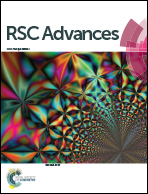Towards computational design of zeolite catalysts for CO2 reduction†
Abstract
Carbon dioxide, an energy waste by-product with significant environmental consequences can be utilized and converted into useful chemical products such as formic acid, formaldehyde, methanol or methane, but more energy and cost efficient catalytic processes are required. Here we develop the methodology for the intelligent selection of porous zeolites for dual-adsorption of hydrogen and carbon dioxide as templates for preparing the optimal catalytic environment for carbon dioxide reduction. Useful zeolite catalysts were computationally screened from over 300 thousand zeolite structures using a combination of molecular simulation and machine-learning techniques. Several of the top candidates were very promising energy-efficient templates for catalysis with the potential to perform at 50% above conventional reactors. It is also found that an optimal cavity size of around 6 Å is required to maximize the change in entropy–enthalpy upon adsorption with a maximum void space >30% to boost product formation per volume of material.


 Please wait while we load your content...
Please wait while we load your content...